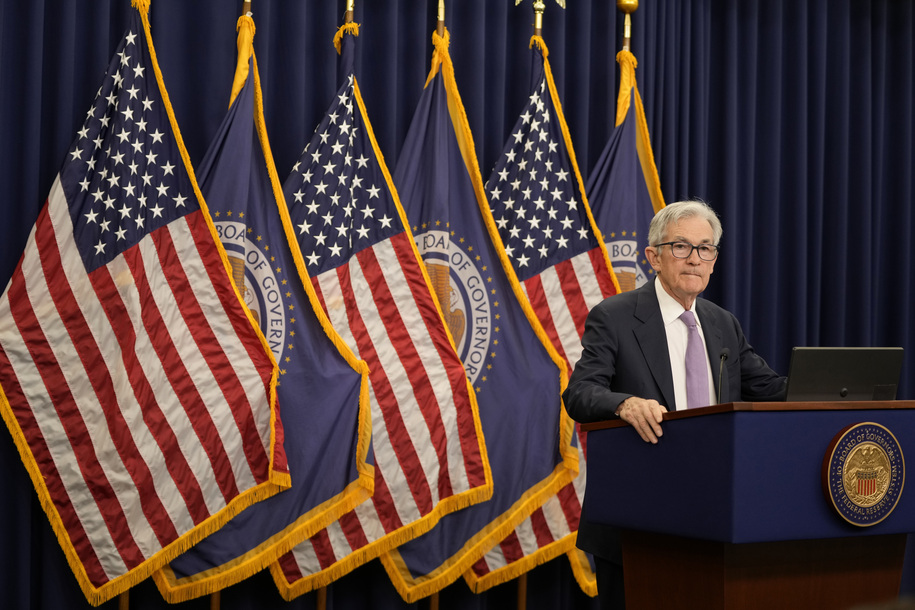The Federal Hold snip its key rate of interest Wednesday through a quarter-point — its 3rd snip this date — but in addition signaled that it expects to shed charges extra slowly later date than it in the past envisioned, in large part as a result of still-elevated inflation.
The Fed’s 19 policymakers projected that they’re going to snip their benchmark charge through a quarter-point simply two times in 2025, i’m sick from their earlier estimate in September of 4 charge cuts. Their fresh quarterly projections counsel that buyers would possibly not revel in a lot decrease charges later date for mortgages, auto loans, bank cards and alternative methods of borrowing.
Fed officers have underscored that they’re slowing their charge discounts as their benchmark charge nears a degree that policymakers the following as “neutral” — the extent this is concept to neither spur nor obstruct the financial system. Wednesday’s projections counsel that policymakers might assume they aren’t very a ways from that degree. Their benchmark charge stands at 4.3% next Wednesday’s proceed, which adopted a steep half-point relief in September and quarter-point snip terminating moment.
This date’s Fed charge discounts have marked a reversal next greater than two years of high rates, which in large part helped tame inflation but in addition made borrowing painfully pricey for American shoppers.
However now, the Fed is going through quite a lot of demanding situations because it seeks to finish a “soft landing” for the financial system, wherein prime charges govern to curb inflation with out inflicting a recession. between them is that inflation extra sticky: In step with the Fed’s most well-liked gauge, annual inflation was once 2.8% in October, the similar as in March and quiet constantly above the central storehouse’s 2% goal.
On the similar occasion, the financial system is rising briskly, which implies that upper charges haven’t a lot stopped the financial system. Consequently, some economists — and a few Fed officers — have argued that borrowing charges shouldn’t be decreased a lot more for worry of overheating the financial system and re-igniting inflation. At the alternative hand, the week of hiring has cooled considerably since 2024 started, a possible concern as a result of one of the crucial Fed’s mandates is to reach most business.
The unemployment charge, life quiet low at 4.2%, has risen just about a complete proportion level within the week two years. Worry over emerging unemployment contributed to the Fed’s choice in September to snip its key charge through a larger-than-usual 1/2 level.
On manage of that, President-elect Donald Trump has proposed a dimension of tax cuts — on Social Safety advantages, tipped source of revenue and additional time source of revenue — in addition to a scaling-back of laws. Jointly, those strikes may stimulate expansion. On the similar occasion, Trump has threatened to impose quite a lot of price lists and to hunt accumulation deportations of migrants, which might boost up inflation.
Chair Jerome Powell and alternative Fed officers have stated they gained’t be capable of assess how Trump’s insurance policies would possibly have an effect on the financial system or their very own charge selections till extra main points are made to be had and it turns into clearer how most likely it’s that the president-elect’s proposals will in truth be enacted. Till later, the end result of the presidential election has most commonly heightened the hesitation climate the financial system.
“I’ve got the least amount of conviction about what will happen with the economy over the next 12 months than I’ve had in years,” stated Subadra Rajappa, head of U.S. charges technique at Societe Generale. “This is going to be a work in progress as things evolve.”
Maximum alternative central banks all over the world also are chopping their benchmark charges. Latter while, the Ecu Central Warehouse lowered its key rate for the fourth occasion this date to three% from 3.25%, as inflation within the 20 nations that importance the euro has fallen to two.3% from a height of 10.6% in past due 2022. The Warehouse of Canada additionally snip its charge through a quarter-point terminating while, as did the Warehouse of England last month.
Beth Hammack, president of the Federal Hold Warehouse of Cleveland, dissented from Wednesday’s Fed choice as a result of she most well-liked to secure charges unchanged. It was once the primary dissent through a Fed committee member since September.
